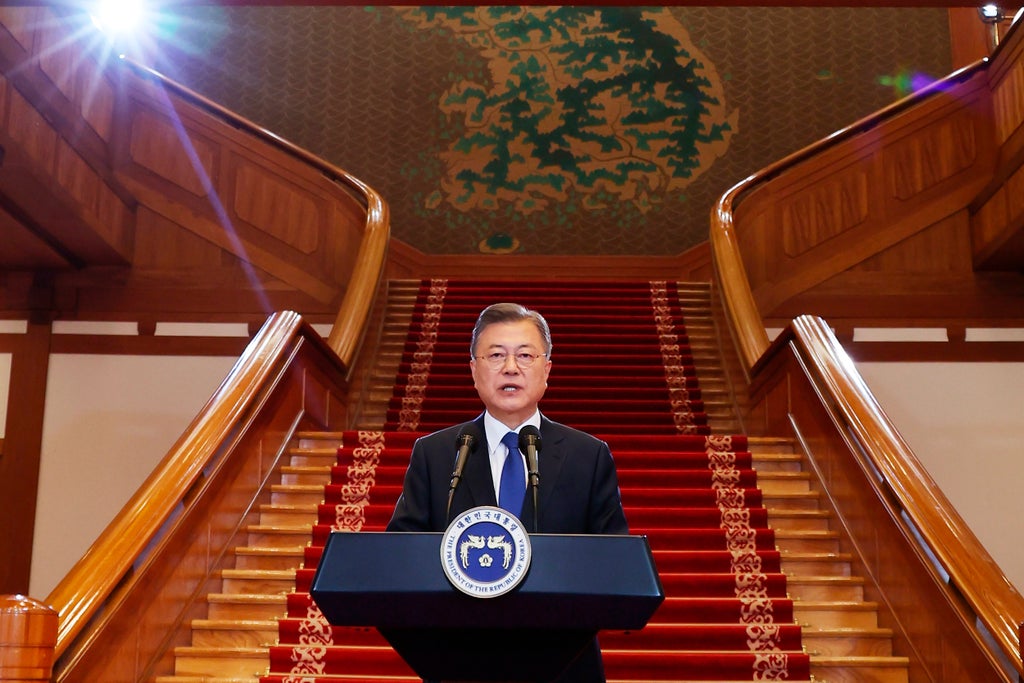
South Korea’s departing liberal president defended his policy of engaging North Korea, saying in his farewell speech Monday that he hopes efforts to restore peace and denuclearization on the Korean Peninsula will continue.
Moon Jae-in leaves office Tuesday following a single five-year term, handing over presidential power and responsibilities to conservative Yoon Suk Yeol, who has accused him of being “subservient” to North Korea and promised to take a tougher stance on the North’s nuclear program.
“Peace is the condition for our survival and prosperity. I heartily hope that efforts to resume dialogue between South and North Korea and establish denuclearization and peace would continue,” Moon said in the nationally televised speech.
When Moon — a dove who favors greater rapprochement between the rival Koreas — took office in 2017, he found little room to maneuver diplomatically because of North Korea’s torrid run of nuclear and missile tests. But he eventually seized an opportunity to reconcile with North Korea when its leader Kim Jong Un abruptly reached out to Seoul and Washington in early 2018 for talks on the future of its advancing nuclear arsenal.
Kim first sent his powerful sister to South Korea for talks with Moon and to let her to attend the opening ceremony of the Winter Olympics in South Korea in February 2018. The two Korean leaders met three times for summits later in 2018, taking steps to lower tensions at the border and allowing rare exchange programs involving singers, basketball teams and others. Moon also lobbied hard to broker now-stalled nuclear diplomacy between Kim and then-U.S. President Donald Trump.
But after the North Korea-U.S. diplomacy collapsed in 2019, Moon has faced withering criticism that his engagement policy only helped North Korea buy time and prefect its weapons program in the face of U.S.-led sanctions and pressure campaign on the North.
Pyongyang eventually urged Moon not to interfere in its dealings with the United States and unleashed crude insults on him.
In his last speech, Moon claimed his government helped ease the danger of war on the Korean Peninsula and bring up hopes for peace through diplomacy.
“The reason why we failed to move forward further wasn’t because we lacked efforts and a determination to do that. There was a barrier that we can’t overcome only with our determination. It’s a barrier that we should overcome,” Moon said, without clarifying what the obstacle was.
Last month, Moon and Kim exchanged their final official letters expressing hope for improved bilateral relations. But some experts say the way North Korea described the letters, in which it highlighted Moon’s vow to continue campaigning for Korean reunification even after leaving office, reflected its intent to divide public opinion in South Korea and discourage Seoul’s new government from taking a hard line toward Pyongyang.
During a massive military parade in Pyongyang three days after the letter exchange was announced, Kim pledged to speed up the development of his nuclear weapons and threatened to use them proactively if provoked. In recent months, Kim's military has also been test-launching a spate of missiles targeting South Korea, Japan or the mainland U.S.
Some experts say Kim aims to rattle Yoon's incoming government while modernizing his weapons arsenal and pressuring the Biden administration into relaxing sanctions on it. South Korean officials say North Korea also appears to be preparing for its first nuclear test since 2017.
__
Associated Press writer Kim Tong-hyung contributed to this report.







